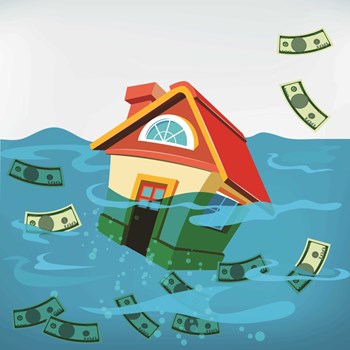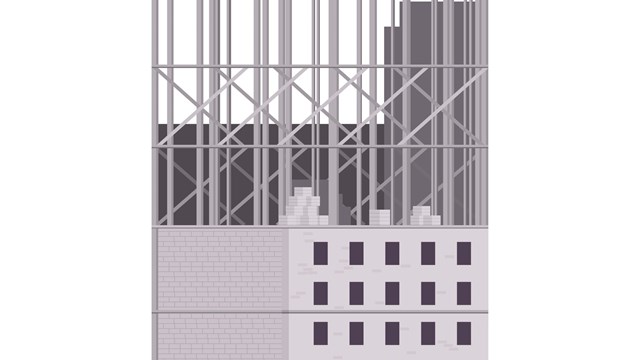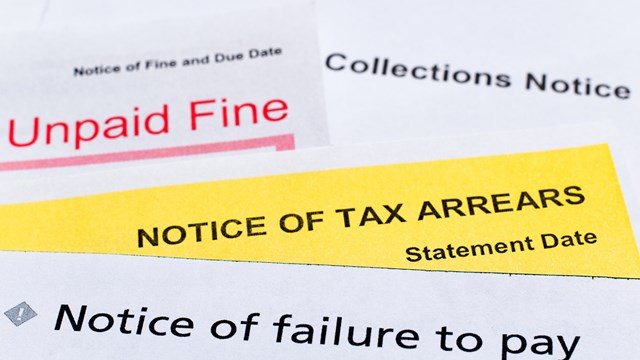
“We have 500 condo accounts and I can count on one or two hands the number of the ones that are not having issues with arrears,” reports Karen Sackstein, CPA, whose accounting firm, The Condo Queens, is based in Fair Lawn, New Jersey. “And that includes associations that have never, ever had a problem before, from two-story brick apartment houses to $2 million townhouses.”
Tough Times
Indeed, there may never be a more challenging time for condominium and homeowners associations when it comes to collecting delinquent maintenance charges. “I’ve been in the industry for 20 years,” says Sackstein, “and this is new.”
Just to cite one example: One of the larger condo communities in the state, Twin Rivers in East Windsor, with 10,000+ residents, details in its monthly newsletters the problems it is facing with arrears. In December 2010, board president Scott Pohl reported that the community, while fiscally sound, was $862,000 in arrears, and currently, foreclosures and arrearages are thankfully, decreasing. The current financial report finds that Twin Rivers holds title to two properties, 7 have paid their assessments in full, 44 stipulations of settlement are current while 7 are delinquent; 32 properties have judgments in progress; 49 properties are in various stages of foreclosure by banks or mortgage lenders; 7 foreclosure actions have been commenced; 16 properties are in bankruptcy; and another 5 are in pending court proceedings.
The reasons for the “why” are easy to explain. According to attorney Steven Chase, a partner with Kramer & Shapiro in Kew Gardens, Queens, “There are owners who have had a perfect record for 20 years and suddenly have lost a job or had a medical issue and because of the economic climate have fallen behind.”
It’s the “how” that is the problem—how to collect arrears from delinquent owners, especially those who, having bought their property during the real estate boom, are underwater and ready to give up on payments altogether.
In the not-so-old days, according to Sackstein, “you’d just get a lien on their property and you wouldn’t worry about it because you knew that the property was going to be sold and once it was sold there was going to be equity and you will eventually get paid all of your late fees and legal fees.”
That was then. “Now people have units that they don’t have equity in,” explains Sackstein. “The units are worth less than what the market value is and even if it is worth market value there is at least one other person [the mortgage holder, typically] in line before the condo association.”
The rules of the game have changed, mostly because of the logjam in the bank foreclosure process. With the sheer volume of mortgages going into default and the added scrutiny on banks after their bad practices have come to light—most famously, Bank of America’s and Wells Fargo’s robo-signing—lenders take a seeming eternity to foreclose the properties on their books, depriving associations of their monthly condo fees—their lifeblood.
Before the real estate crash, explains Sackstein, “if you didn’t pay your bills the bank would foreclose on your mortgage in six to nine months and pay the association the arrears. Now it is around 18 months. And if they are living in the unit you cannot get them out of there.” There are legal recourses for collecting unpaid charges, explained later in this article, but evicting unit owners is not an option.
“With such a long lag,” says Sackstein, “if you have an association that has several units in arrears, it is really affecting the day-to-day operations. I have associations that are barely making their payroll. They are working out payment plans with utility companies.”
What Can a Poor Board Do?
More and more cases wind up in legal these days. “Collection work has been keeping a lot of attorneys very busy,” says Gregory M. Dyer, a partner with the law firm of McCarter & English, in Newark, New Jersey. But most cases can still be settled in-house if the board and management handle them properly.
Most important, says Dyer, “they really need to stay on top of the arrears. If somebody’s falling behind, take action quickly.”
Chase adds that the “property management firm and the board should do an arrears report at least monthly to see who’s in arrears and by how much.” And act immediately—not next month. “If it becomes a huge arrears, it becomes more difficult to manage,” he says.
Management should send a collection notice to an owner that is behind more than a month—and follow that up with a phone call. They might find that association member has lost their job or faces a medical condition but is amenable to setting up a payment plan. The board can consider waiving late fees to help the owner stay on track.
“There are also instances where people are becoming elderly and forget to send in a check,” says Chase, “and sometimes getting in touch with their adult child or family member can remedy that.”
An amenity-rich condo might want get a recalcitrant member’s attention by suspending their membership to the clubhouse, pool or tennis courts. “It is typically under their governing documents that they have the ability to do that,” observes Dyer. Twin Rivers, for example, has decreed in its bylaws that the board can take action to suspend pool and parking privileges of delinquent owners. As long as they don’t go too far.
“Boards have run into problems where there they take actions that are not reasonable,” adds Dyer. “There was a case where they tried to block the owner having access to their own driveway, maybe thinking it was part of the common areas. But the court struck that down.”
While the association should definitely, as a matter of policy, levy a late fee on past due common charges, starting after the end of the first month in which they are due, they should not expect miracles: “I find that they are not a very huge deterrent,” says Chase. “If somebody doesn’t have the money, a five-percent fine doesn’t normally change their behavior.”
“Sending a legal notice often does,” he adds.
Liens & Foreclosures
If the owner does not respond to management’s letter, the association’s lawyer should send a formal letter within 45 to 75 days.
Attorneys must adhere to the requirements of the federal Fair Debt Collection Practices Act (FDCPA) when sending collection letters, also known as dunning letters. The FDCPA is a federal law designed to protect consumers from unfair and illegal collection actions. It places certain disclosure and response obligations on entities that are retained to collect the debt of others. The act applies to any third-party agent that collects a debt for a client, requiring their communications disclose a range of specific information about the debt and the rights of the debtor to dispute the claim.
As the primary party, the condo association itself can ignore the act, but, says Dyer, “to be safe, we advise management companies to comply if they are going to be sending collection-type letters to the unit owners.”
If the delinquent owner doesn’t respond to the lawyer’s letter, “at the 90-day point you need to be talking about liens,” says Sackstein. A lien against the property prevents the owner from selling or refinancing the unit without paying off past-due common charges. It also requires the bank to notify the association if they decide to foreclose on the unit. And if the owner should declare bankruptcy, the lien will increase the association’s chances of getting the debt paid.
Under New Jersey law, the bank holding a mortgage on the condominium has priority over the association’s lien. But, explains Dyer, “the association, if it complies with the New Jersey Condominium Act when they file their lien, can get priority over the bank’s lien for up to six months of common area maintenance fees.”
To qualify to receive the six months of dues in arrears from the bank when it finally forecloses on a property, the condo association must file the lien before the bank starts its foreclosure—a good reason to waste no time in filing after the collection letters—and it must notify the mortgage holder that it is filing the lien.
The lien is quick and inexpensive to execute. While it’s usually handled by the association’s attorney, the board can file on its own by bringing a signed, notarized form to the County Registrar’s office, the same office where deeds are recorded.
The association can and should file a lien against a unit which has ceased paying dues, but with banks taking some 18 months and more to take possession, the payback of six month’s dues to the association will often be less than half of what that owner owed. But it’s better than nothing and the bigger reward is getting an empty unit turned over to a new owner who will likely pay their monthly fees.
Collections Law
Homeowners associations enjoy a special privilege that condominiums do not when it comes to collecting arrears, thanks to a New Jersey Supreme Court case, Highland Lakes vs. Franzio, decided in 2006.
According to attorney Eileen McCarthy Born, of Dolan & Dolan PA in Newton, New Jersey, the firm which won the decision, “The difference with homeowners associations is that you can get all the dues in arrears in the event of a foreclosure. A condominium association is limited to what you can collect based on the Condominium Act,” which provides only six months.
The only prerequisite for requiring a new owner, such as a bank in the event of a foreclosure, to pay all past due fees, is that the bylaws demand it. “As long as you have it stated explicitly in your bylaws,” explains Born, “that serves as notice to purchasers that they will be responsible for paying the outstanding arrears owed to the association.”
Show Me the Money
If the bank has already begun a foreclosure on the unit, it’s too late to file a lien, but the association can pursue a money judgment—sue the owner for breach of their contract with the association, which, according to the bylaws, stipulates that he or she agrees to pay monthly dues to the corporation.
“Now you’re in court,” says Dyer, with the hassle and legal fees that come with that. But the action can be worth the trouble.
“You can wind up with a money judgment against the unit owner that you can execute,” adds Dyer—“go after their wages or other assets, bank accounts, seize property or garnish their wages.” If the suit goes in the association’s favor, the judgment is enforced by a marshal or sheriff, who is entitled, among other things, to confiscate the debtor’s property and sell it at an auction and use the proceeds to pay off the judgment.
Suing for a money judgment is also a means of collecting from an owner who is current with their mortgage but does not pay his or her common charges—though the action can prove futile if the party has no wages to garnish or much in the way of assets.
Take Possession
One interesting legal option that is gaining in popularity today in response to the inordinately long time it takes banks to foreclose these days: get possession of the unit and rent it out. If a unit has been abandoned, as is the case with so many of those bought during the real estate boom and driven underwater by the bust, the board can bring their own foreclosure action on the unit in arrears, even at the same time the bank is foreclosing on it.
Once considered a measure of last resort, reports Dyer, “attorneys are doing that now because with a foreclosure action they can petition the court to have a rent receiver appointed.”
They can get a tenant in and collect rent, Dyer says, all while the bank goes through the motions of their foreclosure action and enjoy the enviable position of rooting for the bank to take forever to foreclose.
“I saw that for the first time five or six years ago but I see that all the time now,” says Sackstein. “If you have somebody that owes you five years worth of fees, you don’t want that foreclosure to happen until you are at that break-even point.” Plus, she adds, “we like that because there is no risk and you don’t have to pay real estate tax.”
Sackstein sometimes offers this last ditch solution for turning a liability into an asset for the association: become a landlord. “If they can buy the unit at a low price at a sheriff’s sale, you wipe off the old maintenance fees, put a little bit of work into it, rent it out and you have a revenue stream coming in.”
Again, she says, “we’re seeing things today that we haven’t seen before.”
Steven Cutler is a freelance writer and a frequent contributor to The New Jersey Cooperator.






3 Comments
Leave a Comment